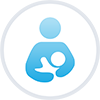Cluster feeding
Feeding | Newborn | | Louise Broadbridge
Sometimes it can feel like your baby wants to feed ALL the time. If your little one seems to have an insatiable appetite and the time between feeds is getting shorter and shorter, they are likely to be cluster feeding.
What is cluster feeding?
Cluster feeding is when a baby suddenly feeds much more frequently than usual for a period of time. The feeds tend to come in clusters and it can last for a couple of hours at a time.
Although cluster feeding is exhausting for parents, it is normal developmental behaviour for a young baby. It typically happens in the first few weeks or months of your baby’s life when you are breastfeeding.
Unfortunately, some new mums misinterpret cluster feeding and think that it is a signal that their body isn’t producing enough milk or that their breastmilk isn’t able to satisfy their baby. However, this isn’t the case and cluster feeding doesn’t indicate there is a problem.
It can, however, help boost your milk production, as the more often your baby feeds, the more breastmilk your body will make to keep up with their appetite.
How to identify if your baby is cluster feeding
It can be tricky to spot if your baby is cluster feeding, especially if they are not in a regular routine. All newborn babies will need to be bottle or breastfed regularly and will usually feed up to 12 times in a 24-hour period.
However, if your baby is feeding much more than that and some of the feeds are very close together, this could be cluster feeding. Cluster feeding is likely if your baby is just a few days or weeks old and they seem to want to feed either constantly or very often.
Your baby will be showing all their usual hunger cues and will not settle until they are fed. Cluster feeding is much more common in breastfed babies than those who are formula fed.
Your baby may spend much longer at the breast before pulling off or they may do the opposite and seem to feed for short periods, almost like having a snack, before showing signs of hunger again very quickly.
Babies who are cluster feeding will be content and settled while nursing and have regular wet and dirty nappies. Once your baby is four days old, they should be producing at least six wet nappies a day. If your baby is very fussy on the breast and seems unsatisfied even when they finish nursing, this could be a sign that there is another problem.
Cluster feeding will often take place in the evening. Some people believe this is because the baby is stocking up on milk, ready for a longer stretch of sleep at night.
Older babies will sometimes cluster feed when they are going through a growth spurt or developmental leap or when they are teething. You may notice that they feed a lot more than usual for several days in a row before slipping back into a similar routine to before.
Sometimes people think fussy babies are cluster feeding when actually they have colic and cry for long periods at a time without settling. However, if your baby has colic then they will not calm or settle after a feed and will remain fussy even while nursing.
How do I deal with cluster feeding?
Cluster feeding can be heavy going for both mum and baby. For a start, feeding so regularly is exhausting and can lead to you feeling emotionally drained and overwhelmed.
Physically it can take a toll too, and you may find your nipples become sore from frequent breastfeeding. You may also feel run down, especially if you are not able to eat and drink regularly and you’re getting very little sleep.
It is really important to stay hydrated when you are breastfeeding so make sure you have a water bottle handy at all times to replace the fluids you are producing. Remember that while this may feel like a bump in your breastfeeding journey, cluster feeding is a normal part of breastfeeding and will not last forever.
Make sure you have plenty of handy snacks near where you breastfeed so you can keep your energy levels up during cluster feeding. You will also feel better if you have something to keep you entertained, whether it is listening to a podcast or audiobook, watching television or even phoning a loved one. Try to change breastfeeding positions every so often to avoid your nipples becoming sore and use a lanolin-based product to soothe and protect them.
If you have a partner or family member who is able to help with the baby, ask them to take the baby as much as possible when you are not feeding so you can take a break and a chance to unwind. Forget about any tasks which are not urgent, most things will be able to wait until this period of cluster feeding passes.
If you have an older child, cluster feeding can be particularly challenging, as it can feel like you are spending all your time with the baby. Putting together a box or basket of special toys which your older child can only play with while you’re breastfeeding can help keep them entertained.
It is also a good idea to breastfeed somewhere where you can spend some quality time with your older children as well. Take the opportunity to talk to them about their day or watch their favourite TV programme with them.
When should I seek help with cluster feeding?
If you are concerned about your baby’s feeding, don’t worry alone. Seek support from your local breastfeeding support team, your health visitor, your GP or a lactation consultant.
They will be able to offer practical advice and support and also check that there aren’t any problems that could be making your breastfeeding journey more challenging. There are also a number of breastfeeding helplines you can call for support.
National Childbirth Trust (NCT)
0300 330 0700
http://www.nct.org.uk/parenting/feeding
National Breastfeeding Helpline
08442 090 920 or 0300 100 0212
Webchat available at http://www.nationalbreastfeedinghelpline.org.uk/
Breastfeeding Network
0300 100 0210


